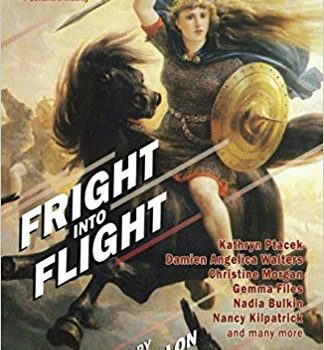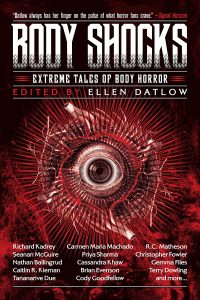Arley Sorg Reviews Fright Into Flight, Edited by Amber Fallon
 Fright Into Flight, Amber Fallon, ed. (Word Horde 978-1-939905-44-4, $15.99, 246pp, tp). September 4, 2018.
Fright Into Flight, Amber Fallon, ed. (Word Horde 978-1-939905-44-4, $15.99, 246pp, tp). September 4, 2018.
Fright Into Flight, Amber Fallon’s editorial debut, is an anthology featuring women as authors and story subjects. Despite the “Fright” part of the title and the “horror” label invoked in the description, not to mention Fallon’s Introduction, “Now Boarding: Your Ticket to Terror”, the stories compiled within are not all horror stories. Those that fall well within the horror genre are not the kind of stories that many people may envision when the word “horror” is used. Tales on offer range from urban-ish fantasy to science fiction to horror in the sense of atmospheric dread, or the strange and unsettling, with a dash of Lovecraftian and a pinch of the hallucinatory. Besides gender, these stories are unified by thoughtfulness and creativity. Fans of shock and gore, or pure pulp horror, or random violence for that matter, will have to look elsewhere to satisfy those cravings.
What appeals about anthologies, including reprint anthologies such as this one, is the discovery of authors and pieces otherwise overlooked. Reprint anthologies are curated suggestions. They are a friend saying, hey, you might have missed this one. That said, friend, not every story reached for the stars. Some felt underdeveloped or lacked sparkle or strength, but many stood out and made this book worth the read.
Fright Into Flight opens with the excellent “Floating Girls” by Damien Anjelica Walters, which sets a high bar for other stories to follow. “Floating Girls” is a slowly unsettling, completely engrossing tale about the second of August, a date on which hundreds of thousands of girls simply float into the sky. A documentarian personally affected by the event attempts to uncover the truth. The narrative utilizes an effective and creeping sense of strangeness, while interrogating the concept of disbelief and denial.
“The Silk Angel” is a World War I period piece by Christine Morgan about the advent and manufacture of parachutes. Outside the realm of horror, it’s perhaps more a modern fairy tale or fantasy work. The voice captures a particular “go get ’em” attitude, exemplified by lines such as, “How any red-blooded chap could expect to show his face back home if he hadn’t done his part…” Its strength lies in its convincing era-familiar feel. The narrative gets lost a bit in info-dump and the plot hinges on an easily guessable idea, but it’s still an interesting and entertaining story.
“Cargo” by Desirina Boskovith is a Cthulhu/Lovecraftian inspired space-horror tale. A small crew of smugglers is hired to transport potentially dangerous cargo to an ethically questionable civilization in the outer regions of known space. Deliciously layered, it offers a sharp examination on the ways we communicate and miscommunicate, with notes of socially conscientious commentary. Craft-wise, there are great characterizations, as well as wonderful tension and conflict, all wrapped in a neat, well-handled span of narrative space. Read it for the great portrayal of the protagonist, read it to learn how to write a solid story in a confined word count, or read it just because you love space stories and Lovecraftian madness.
“Every Angel” by Gemma Files treats the reader to a cool, confident voice and an easy but vibrant tone. A crime boss obsessed with Christianity sends his minions to capture what may be an actual angel — or may be something else. Immediate tension is followed by a smooth, plot-driven narrative. Familiar concepts are rendered interesting by inventive twists or new details. Cultural references tempt the reader to place the story in the real world. Overall, simply put, this is a solid, nicely constructed story.
Rebecca Gomez Farrell’s too-brief “Thlush-a-lum” is a sensory marvel, exploiting sound and developing a lovely sense of atmosphere and dread. A young girl growing up with emotionally distant parents is terrorized by the sounds outside her bedroom. Well, that’s not quite it, but it’s close, and I don’t want to give everything away. This is an idea piece and as such it is properly short and to the point. The thematic concept isn’t new but the execution is well done. The opening is so effective that, after being lured into the story, I would have liked to live in those moments for a longer tale, I would have stayed for a plot with development and turns. Served as is, this is still a tantalizing amuse-bouche, tempting me to seek out more offerings from this author.
Nadia Bulkin’s “And When She Was Bad” is a jarring and fascinating interrogation of the horror trope of the “final girl” (the last survivor of a standard sort of horror story — often a girl, such as the one person in the movie who didn’t have sex, or the one girl who was kind while her friends made fun of whomever, and so on). In this story a “final girl” has survived, has even injured the monster, and now she has to decide what to do next — including whether or not she should try to finish the monster off. This piece is sly, raising questions in brief, light-handed strokes. It utilizes narrative techniques which would drag at the hands of many otherwise capable writers, taking the reader through the secret transformations of the final girl.
Sixteen stories comprise Fright Into Flight, ranging from short to very short, from sketches of ideas to carefully navigated plots. Bulkin’s piece makes a smart and fitting book-end. Paired with Walters’s opening piece, the composed whole creates a sense of accomplished writing and memorable stories.
 This review and more like it in the December 2018 issue of Locus.
This review and more like it in the December 2018 issue of Locus.
While you are here, please take a moment to support Locus with a one-time or recurring donation. We rely on reader donations to keep the magazine and site going, and would like to keep the site paywall free, but WE NEED YOUR FINANCIAL SUPPORT to continue quality coverage of the science fiction and fantasy field.







